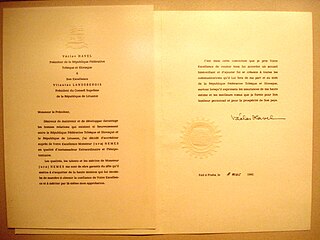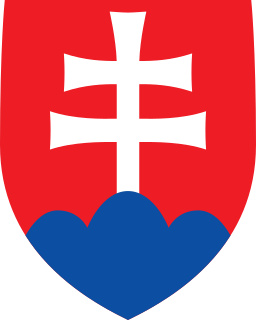
After independence in 1964 Malta followed a policy of close co-operation with NATO countries. Since 1971 the country sought relations with the rest of the World, including communist countries in Eastern Europe and the non-Aligned countries.

An ambassador is an official envoy, especially a high-ranking diplomat who represents a state and is usually accredited to another sovereign state or to an international organization as the resident representative of their own government or sovereign or appointed for a special and often temporary diplomatic assignment. The word is also often used more liberally for persons who are known, without national appointment, to represent certain professions, activities and fields of endeavor such as sales.

Bhutan has diplomatic relations with 52 states and the European Union.

A letter of credence is a formal diplomatic letter that appoints a diplomat as ambassador to another sovereign state. Commonly known as diplomatic credentials, the letter is addressed from one head of state to another, asking him to give credence to whatever the ambassador may say on his country's behalf. The letter is presented personally by the ambassador to the receiving head of state in a formal ceremony, marking the beginning of the ambassadorship.

An Apostolic Nunciature is a top-level diplomatic mission of the Holy See, equivalent to an embassy. However, it does not issue visas, nor does it have consulates.
Diplomatic rank is a system of professional and social rank used in the world of diplomacy and international relations. A diplomat's rank determines many ceremonial details, such as the order of precedence at official processions, table seatings at state dinners, the person to whom diplomatic credentials should be presented, and the title by which the diplomat should be addressed.

Maltese-Serbian relations are foreign relations between Malta and Serbia. Both countries established diplomatic relations in 1964. Malta is represented in Serbia through a non-resident ambassador based in Valletta. Serbia is represented in Malta through its embassy in Rome (Italy) and through an honorary consulate in Valletta.

The Ministry of Foreign Affairs is the government ministry of Liberia responsible for directing Liberia's external relations and the management of its international diplomatic missions. The ministry is located in Monrovia, Liberia's capital.

The Ministry of Foreign and European Affairs is responsible for maintaining the Slovak Republic's external relations and the management of its international diplomatic missions. The ministry's director is Miroslav Lajčák.

The Ministry of Foreign Affairs is the government ministry of Guyana responsible for directing the nation's external relations and the operations of its international diplomatic missions. Carl Barrington Greenidge has directed the ministry as Minister of Foreign Affairs since May 2015. The ministry is located in the capital city, Georgetown.
The Malta Environment and Planning Authority (MEPA) was the national agency responsible for the environment and planning in Malta. The national agency was established to regulate the environment and planning on the Maltese islands of Malta, Gozo and other small islets of the Maltese archipelago. MEPA is bound to follow the regulations of the Environment Protection Act (2001) and the Development Planning Act (1992) of the Laws of Malta. The national agency is also responsible for the implementation of Directives, Decisions and Regulations under the EU Environmental Acquis as Malta is a member of the European Union, while considering other recommendations and opinion of the Union. The Authority employs over 420 government workers, from a wide range of educational backgrounds, all within their merit of profession. The Officio delle Case was the planning authority during the Order of St. John.

Palazzo Parisio, sometimes known as Casa Parisio, is a palace in Valletta, Malta. It was built in the 1740s by Domenico Sceberras, and eventually passed into the hands of the Muscati and Parisio Muscati families. It was Napoleon's residence for six days in June 1798, during the early days of the French occupation of Malta. The palace was eventually acquired by the de Piro family, and was later purchased by the Government of Malta. It was used as the General Post Office from 1886 to 1973, then the Ministry for Agriculture, and it now houses the Ministry for Foreign Affairs.

Japan–Malta relations refers to bilateral foreign relations between Japan and Malta. Their diplomatic relations were established in 1965. Malta has a consulate in Tokyo. Japan has an Embassy to Malta, which is part of the Embassy of Japan in Rome, Italy, and a consulate in Valletta, Malta.

Libya–Spain relations are the bilateral and diplomatic relations between these two countries. Libya has an embassy in Madrid, and Spain has one in Tripoli.















